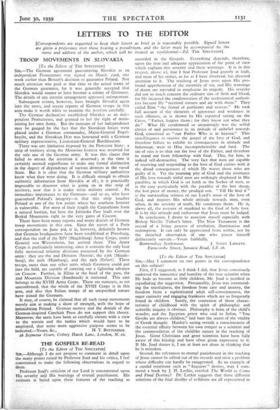LETTERS TO THE EDITOR
[Correspondents are requested to keep their letters as brief as is reasonably possible. Signed letters are given a preference over those bearing a pseudoriym, and the latter must be accompanied by the name and address of the author, which will be treated as confidential.—Ed. THE SPECTATOR] TROOP MOVEMENTS IN SLOVAKIA [To the Editor of THE SPECTATOR]
SIR,—The German agreement guaranteeing Slovakia as an independent Protectorate was signed on March 23rd, one week earlier than Britain's decision to guarantee Poland. Not much attention was paid at that time to the actual terms of the German guarantee, for it was generally accepted that Slovakia would sooner or later become a colony of Germany. The details of any interim arrangement appeared unimportant.
Subsequent events, however, have brought Slovakia again into the news, and recent reports of German troops in this area make it worth while to examine the position carefully.
The German declaration established Slovakia as an inde- pendent Protectorate, and granted to her the right of main- taining her own Army. But the measure of her independence may be gauged by the fact that the Slovakian forces were placed under a German commander, Major-General Engel-. brecht, and the Slovakian Diet was honoured with a German military representative, Lieutenant-General Barckhausen.
There was one limitation imposed by the Protector State: a strip of territory along the Moravian frontier was reserved for the sole use of the German army. It was this clause that failed to attract the attention it deserved ; at the time it certainly seemed superfluous to make any formal distinction in the degree of dependence of various districts in the vassal State. But it is clear that the German military authorities knew what they were doing. It is difficult enough to obtain authentic information from Slovakia at all ; it is practically impossible to discover what is going on in this strip of territory, now that it is under strict military control. Its immediate importance to the Germans—and to us, who have guaranteed Poland's integrity—is that this strip touches Poland at one of the few points where her southern frontier is vulnerable. For most of their length the Carpathians form a natural bastion, but here the Jablunka Pass leads over the Beskid Mountains right to the very gates of Cracow.
There have been many reports and many denials of German troop movements in this area. Since the report of a Paris correspondent on June 3rd, it is, however, definitely known that German headquarters have been established at Pressburg, and that the staff of the XIV (Magdeburg) Army Corps, under General von Wietersheim, has arrived there. This Army Corps is particularly interesting, since it contains the only four fully motorised infantry divisions possessed by the German army : they are the znd Division (Stettin), the t3th (Magde- burg), the 2oth (Hamburg), and the 29th (Erfurt). These troops, more than any other units which Germany could put into the field, are capable of carrying out a lightning advance 'on Cracow. Further, in Zilina at the head of the pass, the and Mountain Division (Innsbruck) is stationed. This unit belongs to the XVIII Army Corps. There are rumours, as yet unconfirmed, that the whole of the XVIII Corps is in this area, and also that Italian troops of an unspecified nature have joined the Germans.
It may, of course, be claimed that all such troop movements merely aim at making a show of strength, with the hope of intimidating Poland. German secrecy and the denials of the German-inspired Czechish Press do not support this theory. Moreover, the units have been so carefully chosen with a view to the terrain and the tactics which would have to be employed, that some more aggressive purpose seems to be










































 Previous page
Previous page